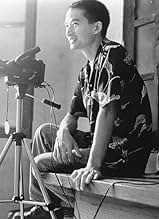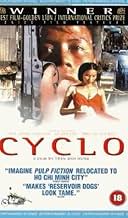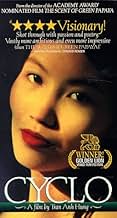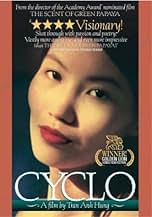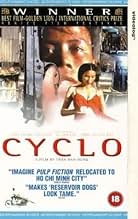NOTE IMDb
7,1/10
5,8 k
MA NOTE
Ajouter une intrigue dans votre langueWhen a poor bicycle-taxi driver has his cyclo stolen, he is forced into a life of crime. Meanwhile, his sister becomes a prostitute.When a poor bicycle-taxi driver has his cyclo stolen, he is forced into a life of crime. Meanwhile, his sister becomes a prostitute.When a poor bicycle-taxi driver has his cyclo stolen, he is forced into a life of crime. Meanwhile, his sister becomes a prostitute.
- Réalisation
- Scénario
- Casting principal
- Récompenses
- 4 victoires et 1 nomination au total
Tony Leung Chiu-wai
- Poet
- (as Tony Chiu Wai Leung)
Nu Yên-Khê Tran
- Sister
- (as Tran Nu Yên-Khê)
Thinh Trinh
- Foot Fetishist
- (as Trinh Thinh)
Avis à la une
Sons lose their fathers, and miss their fathers. In Cyclo, the young man, who earns his living and supports his family by driving a rental cyclo (bicycle-taxi), is a child without parents. In Cyclo, the poet is a child that cannot be accepted by his father. In Cyclo, the retarded son of a widow is a symbol that by which the widow connects in spirit with his father, her dead lover. Under the tangle of missing, recollection of, and conflicting with fathers, Cyclo shows sons going through the shadow of fathers to rediscover themselves.
Father is a symbol of a family, that, when amplified, becomes a nation. In an article "no longer in a future heaven," the author McClintock mentions an idea: mother represents the history of a nation. However, in Cyclo, father (male) symbolizes the history and means where a son comes from. Leaving Vietnam since childhood, the director Tran is detached from Vietnam¡¦s history. But he still is a Vietnamese, because he comes from his father, a Vietnamese. However, to some degree, he is a child without father the history and memory of the Vietnamese past. To Tran, Vietnam, Ho Chi Minh City, and the people in there seem familiar, but are strange, actually. Maybe this can provide one reason as to why Tran uses the characters to spy on people in the streets of Ho Chi Minh City through the frames of windows or lenses. In some situations, spying means alienation-- an ambiguous mood about being eager for something but afraid to get close.
In my view, the women characters in Cyclo have two meanings. First, woman as mother is the one who protects the father's heritage. The widow is an example. She does her best to take care of her son, because in her mind, the son comes from his father and is a reflection of his father, even though he is retarded. The young man's sister, a virgin, represents the sacred image of a nation, which is cannot be invaded. Therefore, when she is assaulted, her man, the poet, rages to kill the attacker.
The characters in Cyclo do not have a name. However, this does not stop audiences to recognize them, or furthermore, to identify with them. Through gazing at their lives, behaviors, and psychological reactions, the young man could be you and me, and the poet could be anyone. They represent different types of people. The young man is a lost lamb. He at once identifies another father-image, the poet. But finally, he knows he is wrong. The poet represents contradictions. His present conflicts with the past (father), and his mentality clashes with his behaviors. If this film is allegorical of a collective loss of innocence of a nation, those characters reflect and depict Vietnamese situations from the director's point of view.
The end of the film shows the young man carrying his grandfather, elder sister and younger sister with a cyclo in a crowded street of Ho Chi Minh City. Sunshine brightly sprinkles on them, and they look very happy. The ending scene shows that through all the chaos, the young man finally rediscovers and re-builds himself in the present. Separated from the past, a son can still live well. Maybe to the Vietnamese, past is past; what is important is the present and future. To Tran, what is important is self-identified.
This is a movie that I strongly recommend.
Father is a symbol of a family, that, when amplified, becomes a nation. In an article "no longer in a future heaven," the author McClintock mentions an idea: mother represents the history of a nation. However, in Cyclo, father (male) symbolizes the history and means where a son comes from. Leaving Vietnam since childhood, the director Tran is detached from Vietnam¡¦s history. But he still is a Vietnamese, because he comes from his father, a Vietnamese. However, to some degree, he is a child without father the history and memory of the Vietnamese past. To Tran, Vietnam, Ho Chi Minh City, and the people in there seem familiar, but are strange, actually. Maybe this can provide one reason as to why Tran uses the characters to spy on people in the streets of Ho Chi Minh City through the frames of windows or lenses. In some situations, spying means alienation-- an ambiguous mood about being eager for something but afraid to get close.
In my view, the women characters in Cyclo have two meanings. First, woman as mother is the one who protects the father's heritage. The widow is an example. She does her best to take care of her son, because in her mind, the son comes from his father and is a reflection of his father, even though he is retarded. The young man's sister, a virgin, represents the sacred image of a nation, which is cannot be invaded. Therefore, when she is assaulted, her man, the poet, rages to kill the attacker.
The characters in Cyclo do not have a name. However, this does not stop audiences to recognize them, or furthermore, to identify with them. Through gazing at their lives, behaviors, and psychological reactions, the young man could be you and me, and the poet could be anyone. They represent different types of people. The young man is a lost lamb. He at once identifies another father-image, the poet. But finally, he knows he is wrong. The poet represents contradictions. His present conflicts with the past (father), and his mentality clashes with his behaviors. If this film is allegorical of a collective loss of innocence of a nation, those characters reflect and depict Vietnamese situations from the director's point of view.
The end of the film shows the young man carrying his grandfather, elder sister and younger sister with a cyclo in a crowded street of Ho Chi Minh City. Sunshine brightly sprinkles on them, and they look very happy. The ending scene shows that through all the chaos, the young man finally rediscovers and re-builds himself in the present. Separated from the past, a son can still live well. Maybe to the Vietnamese, past is past; what is important is the present and future. To Tran, what is important is self-identified.
This is a movie that I strongly recommend.
Another reviewer correctly pointed out this film's weakness: the script. The story starts out strong then about a third of the way through it hops the track.
After that, if you can tell what is going on and above all WHY, you're pretty good--or friends with the author.
The government of the People's Republic of Vietnam cooperated in making this film for, I suspect, political reasons. Specifically, to paint the Chinese and China in a bad light. The setting is Cholon, the Chinatown section of the old city of Saigon, the former capital of the Republic of (South) Vietnam. Saigon is now Ho Chi Minh City of course and the Chinese are almost all gone, fled from the persecution that preceded and followed the 1979 Sino-Vietnamese border war. Even in 1994 when the picture was shot relations between China and Vietnam were tense. This movie depicts Cholon as a center of drug trafficking, vice, thievery and murder in which the U.S. dollar is the most desired currency.
The camera work by Frenchman Benoit Delhomme is pure artistry. Production values are high. The leading lady Tran Nhu Yen-Khe is absolutely riveting--her exotic beauty the best thing by far about the picture. There are some interesting backgrounds, particularly a short interlude where Poet, played by Hong Kong actor Tony Leung, and Sister (Ms. Yen-Khe) escape the filthy and impoverished inner city and spend a day in the countryside. It is no accident I am sure that some of the French architecture that still stands is featured.
The minor roles are convincingly played, the characters sharply defined for all their brief appearances. It is at the center that the film's weaknesses are most evident.
After that, if you can tell what is going on and above all WHY, you're pretty good--or friends with the author.
The government of the People's Republic of Vietnam cooperated in making this film for, I suspect, political reasons. Specifically, to paint the Chinese and China in a bad light. The setting is Cholon, the Chinatown section of the old city of Saigon, the former capital of the Republic of (South) Vietnam. Saigon is now Ho Chi Minh City of course and the Chinese are almost all gone, fled from the persecution that preceded and followed the 1979 Sino-Vietnamese border war. Even in 1994 when the picture was shot relations between China and Vietnam were tense. This movie depicts Cholon as a center of drug trafficking, vice, thievery and murder in which the U.S. dollar is the most desired currency.
The camera work by Frenchman Benoit Delhomme is pure artistry. Production values are high. The leading lady Tran Nhu Yen-Khe is absolutely riveting--her exotic beauty the best thing by far about the picture. There are some interesting backgrounds, particularly a short interlude where Poet, played by Hong Kong actor Tony Leung, and Sister (Ms. Yen-Khe) escape the filthy and impoverished inner city and spend a day in the countryside. It is no accident I am sure that some of the French architecture that still stands is featured.
The minor roles are convincingly played, the characters sharply defined for all their brief appearances. It is at the center that the film's weaknesses are most evident.
"Cyclo" begins with neo-realist naturalism, as a young man struggles day to day driving his cycle taxi in modern day Vietnam. His father has just died, and after working his entire life as a bike-taxi driver, has nothing to leave his children, but the suggestion that they might find something nobler to do with their lives. The young man spends his days navigating the alleys and the side streets for the quickest routes and attempting to avoid collisions with other bike taxi drivers who have divided the city into turfs and gangs, of who can pick up customers where.
One day his taxi is stolen, and to repay the taxi's owner (a local lady crime boss); he has to take on a series of petty crimes to pay the debt. The young man is never given a name; the credits refer to him as "Cyclo", his sister as "sister" etc. His sister(played by the gorgeous Tran Nu Yen-Khe begins a tenuous relationship with the boss of the gang Youth works for, a silent constantly smoking man called "Poet" played by the always excellent Tony Leung.
By relationship I mean he pimps her out to old business men provided they "not touch her", instead she indulges their foot and urine fetishes, in at first disturbing and then increasingly reflective and resigned scenes. The Poet rarely speaks but we hear his poetry for time to time in voice over, obliquely appearing and disappearing. The first half of the film focuses more on Cyclo getting in over his head with the gang, stealing, transporting drugs,and lighting a rival building on fire with a Molotov cocktail.
The second half shows us more of the "Poet" and "the Sister". Dialog is sparse throughout, but the sister seems to only really exist in relation to the poet, he pimps her out, but not too much. That may be going too far, as we do get a "sense" that her indulging the fetishists is more amusing and certainly less physically tiring than the work she was doing before. Leung's apartment becomes a kind of club house for the girls, a paradoxical bordello of innocence. The Poet is corrupt but wants to keep some aspects of his life pure. There are scenes where he is beaten by his father and collapses into sudden helpless boyhood, and a virtuoso and pivotal scene in a nightclub set to Radiohead's "Creep", in the best tradition of using pop songs to encapsulate not just moment in time (the 90's in which the film is set), but the very heart of a character. When Yorke sings "what the hell am I doing here?" it might as well be Leong singing it aloud.
As Cyclo becomes more fascinated with the power, attention, and adrenalin rush he is getting from the gang, "Poet" becomes more aloof splitting his time between the three girls he pimps, and he the lady crime boss who he serves as soldier and lover(or whore depending on how you look at it). Vietnamese/French director Ahn Hung Tran delicately weaves us in and out of violence and tranquil beauty, near psychedelic explosions of color and poetic reflections, pimps and corpses and children happily at play.
After he commits his first major crime, we see him covered in filth, as he had to escape the police in a river or tunnel. The escape isn't fully shown, and we are left with the image of the crime and then the criminal covered in what looks like s*&t; insects crawling slowly across his lips in a close up. To clean his face he puts it in a fish bowl (his only company in the dilapidated room the Poet forces him to live in.), and effectively contaminates the world of the only friend he had. It's a great visual metaphor for gang violence and corruption and its effect on community life, it just makes everything dirtier and sh*&$ier.
By the end of the film, Cyclo does not come to his senses, but implodes on himself, and get's a brief offer to escape the life he bumbled or was forced into (its implied that one of the Lady crime bosses henchman was involved in stealing Cyclo's taxi in the first place.) The crime queen's handicapped son, who is Youth's same age, is a kind of mirror image of him throughout the film; financially privileged to his economic struggle, an eternal child to his forced growing-up, the apple of his mother's eye to the deafening absence of being an orphan. Cyclo's blue neon painted face at the end is less about psychedelic freak out as it is a desperate desire to escape back to the simplicities of childhood.
The fates of the Poet, Youth, and the crime mistresses' son each reach their peak, at the same moment, showing us the product of innocence/idiocy and evil/apathy. In psychological terms this is guilty and reflective super-ego (poetic Leung) and impulsive childish Id (overgrown man-child son) on two opposite poles of self-destruction, and Ego sandwiched between the two, clinging to a faint possibility of hope/rationality.
"Cyclo" is compulsively watchable and despite its experimentations easily accessible. The films score reminded me of a Hitchcock film, and is responsible in large to the films strange atmosphere, as if a horror film lurks just beneath the surface at all times, waiting to escape. In a sense the ominous sound-scape is fitting, as there is a horror waiting to devour the characters, and it is their lives. "Cyclo's" cinematic and aesthetic techniques amount to nothing less than incredibly solid and visually breathtaking storytelling, that elevates it's well-worn concept a step above the rest.
One day his taxi is stolen, and to repay the taxi's owner (a local lady crime boss); he has to take on a series of petty crimes to pay the debt. The young man is never given a name; the credits refer to him as "Cyclo", his sister as "sister" etc. His sister(played by the gorgeous Tran Nu Yen-Khe begins a tenuous relationship with the boss of the gang Youth works for, a silent constantly smoking man called "Poet" played by the always excellent Tony Leung.
By relationship I mean he pimps her out to old business men provided they "not touch her", instead she indulges their foot and urine fetishes, in at first disturbing and then increasingly reflective and resigned scenes. The Poet rarely speaks but we hear his poetry for time to time in voice over, obliquely appearing and disappearing. The first half of the film focuses more on Cyclo getting in over his head with the gang, stealing, transporting drugs,and lighting a rival building on fire with a Molotov cocktail.
The second half shows us more of the "Poet" and "the Sister". Dialog is sparse throughout, but the sister seems to only really exist in relation to the poet, he pimps her out, but not too much. That may be going too far, as we do get a "sense" that her indulging the fetishists is more amusing and certainly less physically tiring than the work she was doing before. Leung's apartment becomes a kind of club house for the girls, a paradoxical bordello of innocence. The Poet is corrupt but wants to keep some aspects of his life pure. There are scenes where he is beaten by his father and collapses into sudden helpless boyhood, and a virtuoso and pivotal scene in a nightclub set to Radiohead's "Creep", in the best tradition of using pop songs to encapsulate not just moment in time (the 90's in which the film is set), but the very heart of a character. When Yorke sings "what the hell am I doing here?" it might as well be Leong singing it aloud.
As Cyclo becomes more fascinated with the power, attention, and adrenalin rush he is getting from the gang, "Poet" becomes more aloof splitting his time between the three girls he pimps, and he the lady crime boss who he serves as soldier and lover(or whore depending on how you look at it). Vietnamese/French director Ahn Hung Tran delicately weaves us in and out of violence and tranquil beauty, near psychedelic explosions of color and poetic reflections, pimps and corpses and children happily at play.
After he commits his first major crime, we see him covered in filth, as he had to escape the police in a river or tunnel. The escape isn't fully shown, and we are left with the image of the crime and then the criminal covered in what looks like s*&t; insects crawling slowly across his lips in a close up. To clean his face he puts it in a fish bowl (his only company in the dilapidated room the Poet forces him to live in.), and effectively contaminates the world of the only friend he had. It's a great visual metaphor for gang violence and corruption and its effect on community life, it just makes everything dirtier and sh*&$ier.
By the end of the film, Cyclo does not come to his senses, but implodes on himself, and get's a brief offer to escape the life he bumbled or was forced into (its implied that one of the Lady crime bosses henchman was involved in stealing Cyclo's taxi in the first place.) The crime queen's handicapped son, who is Youth's same age, is a kind of mirror image of him throughout the film; financially privileged to his economic struggle, an eternal child to his forced growing-up, the apple of his mother's eye to the deafening absence of being an orphan. Cyclo's blue neon painted face at the end is less about psychedelic freak out as it is a desperate desire to escape back to the simplicities of childhood.
The fates of the Poet, Youth, and the crime mistresses' son each reach their peak, at the same moment, showing us the product of innocence/idiocy and evil/apathy. In psychological terms this is guilty and reflective super-ego (poetic Leung) and impulsive childish Id (overgrown man-child son) on two opposite poles of self-destruction, and Ego sandwiched between the two, clinging to a faint possibility of hope/rationality.
"Cyclo" is compulsively watchable and despite its experimentations easily accessible. The films score reminded me of a Hitchcock film, and is responsible in large to the films strange atmosphere, as if a horror film lurks just beneath the surface at all times, waiting to escape. In a sense the ominous sound-scape is fitting, as there is a horror waiting to devour the characters, and it is their lives. "Cyclo's" cinematic and aesthetic techniques amount to nothing less than incredibly solid and visually breathtaking storytelling, that elevates it's well-worn concept a step above the rest.
In Vietnam, a cyclo is both the driver of a bicycle taxi and a name given to the taxi itself. In Tran Anh Hung's 1995 film Cyclo, the cyclo driver is a naïve 18-year old (Le Van Loc) whose innocence is corrupted by the choices he is compelled to make to escape the circle of grinding poverty. Cyclo is far removed from the director's introspective and contemplative dramas (Scent of Green Papaya, Vertical Ray of the Sun) that preceded and followed it. In Cyclo, Tran assaults our senses with the churning swirl of colors and sounds of Ho Chi Minh City, capturing the vibrations of the city with its street markets, pavement cafes, sidewalk vendors, and choking traffic. He also shows the underbelly of the city: its violence, flesh for hire, and atmosphere of poverty, dirt, and decay. While the violence is graphic and unsettling, it is not exploitative and without the glamour associated with gangster films. Cyclo has little dialogue, mostly gestures and silences, and cinematographer Benoit Delhomme's focus on the underlying beauty of the city gives the film a lyricism that renders the violence ambiguous.
Cyclo has lost both parents and lives in near poverty with his grandfather (Le Kinh Huy), who continues to work fixing bicycle tires despite his failing health. His younger sister (Phan Ngoc Lieu) earns a living by shining shoes outside of restaurants and the older sister (Tran Nu Yen-Khe) works as a cook and delivery person. Cyclo's father was also a pedicab driver but was killed when he was hit by a truck. Cyclo's boss (Nguyen Nhu) is known only as the Boss Lady (none of the characters in the film are named) who leads a criminal operation while taking care of her retarded son (Bjuhoang Huy). When Cyclo's bicycle is stolen by a rival gang, the young man is recruited by the Boss lady and her associate, The Poet (Tony Leung Chiu Wai), a small-time hoodlum and pimp, to work off his debt.
The Poet is involved with robberies, sabotage, drug trafficking, and prostitution and is no stranger to homicide. He is strangely sympathetic to Cyclo, however, and seems to share with him the common longing for an absent father as revealed in the poetry he reads to him. Cyclo asks to join his gang but, in response, is forced to witness a mobster singing lullabies while he knifes a victim who is bound and gagged. Unknown to Cyclo, the Poet recruits his older sister into prostitution, making her available to men interested in various fetishes while preserving her virginity, presumably out of his own love for her. When her virginity is finally violated, The Poet tracks down and brutally murders the offending patron. Cyclo is forced to stay in an apartment away from his family and told to perform errands for the gang such as smuggling dope hidden in slaughtered cattle and throwing a gasoline firebomb into the building of the rival gang that stole his pedicab.
Tran's vision is hallucinatory and unnerving and I often found myself unable to distinguish between what is real and what is a dream. The story is told from Cyclo's perspective and we enter his mind to witness his steady descent into confusion and fear, culminating in a memorable sequence where he combines pills and liquor and drenches himself in blue paint. Cyclo is disturbing and raw but it is an original work of art, both a brutal and often bizarre look at Saigon's mean streets, and a searing love poem to the city and a young man who finally steps outside the vicious circle to discover himself beyond the chaos.
Cyclo has lost both parents and lives in near poverty with his grandfather (Le Kinh Huy), who continues to work fixing bicycle tires despite his failing health. His younger sister (Phan Ngoc Lieu) earns a living by shining shoes outside of restaurants and the older sister (Tran Nu Yen-Khe) works as a cook and delivery person. Cyclo's father was also a pedicab driver but was killed when he was hit by a truck. Cyclo's boss (Nguyen Nhu) is known only as the Boss Lady (none of the characters in the film are named) who leads a criminal operation while taking care of her retarded son (Bjuhoang Huy). When Cyclo's bicycle is stolen by a rival gang, the young man is recruited by the Boss lady and her associate, The Poet (Tony Leung Chiu Wai), a small-time hoodlum and pimp, to work off his debt.
The Poet is involved with robberies, sabotage, drug trafficking, and prostitution and is no stranger to homicide. He is strangely sympathetic to Cyclo, however, and seems to share with him the common longing for an absent father as revealed in the poetry he reads to him. Cyclo asks to join his gang but, in response, is forced to witness a mobster singing lullabies while he knifes a victim who is bound and gagged. Unknown to Cyclo, the Poet recruits his older sister into prostitution, making her available to men interested in various fetishes while preserving her virginity, presumably out of his own love for her. When her virginity is finally violated, The Poet tracks down and brutally murders the offending patron. Cyclo is forced to stay in an apartment away from his family and told to perform errands for the gang such as smuggling dope hidden in slaughtered cattle and throwing a gasoline firebomb into the building of the rival gang that stole his pedicab.
Tran's vision is hallucinatory and unnerving and I often found myself unable to distinguish between what is real and what is a dream. The story is told from Cyclo's perspective and we enter his mind to witness his steady descent into confusion and fear, culminating in a memorable sequence where he combines pills and liquor and drenches himself in blue paint. Cyclo is disturbing and raw but it is an original work of art, both a brutal and often bizarre look at Saigon's mean streets, and a searing love poem to the city and a young man who finally steps outside the vicious circle to discover himself beyond the chaos.
10gray4
This is an astonishing film. It captures Vietnam as it transforms from a tightly controlled communist state to a free-market economy, with the poverty, crime, overcrowding and squalor in graphic detail. It must be one of the most dramatic portraits of Third World poverty ever put on film.
The story of a young man's descent and redemption goes back to 1930s Hollywood and the Italian neo-realists. But it is transformed by its setting in a Saigon hell-hole, and by the complexity of the characters. There are no stereotypes. Even the most vicious pimps and murderers have redeeming features. And an overall theme of a father's influence on his sons is distinctively Asian. The emigre Vietnamese director Anh Hung Tran brings a cold, sharp yet loving eye to Saigon and Vietnam. One of the greatest films of the 1990s.
The story of a young man's descent and redemption goes back to 1930s Hollywood and the Italian neo-realists. But it is transformed by its setting in a Saigon hell-hole, and by the complexity of the characters. There are no stereotypes. Even the most vicious pimps and murderers have redeeming features. And an overall theme of a father's influence on his sons is distinctively Asian. The emigre Vietnamese director Anh Hung Tran brings a cold, sharp yet loving eye to Saigon and Vietnam. One of the greatest films of the 1990s.
Le saviez-vous
- AnecdotesMade and banned in Vietnam. Criticised as too 'westernised' in its gritty and unrelenting portrayal of urban poverty in the country. The film has nevertheless received international acclaim, winning the Golden Lion Award in Venice in 1995.
- ConnexionsReferenced in Dog Park (1998)
- Bandes originalesCreep
Written by Albert Hammond, Mike Hazlewood, Thom Yorke, Jonny Greenwood, Colin Greenwood, Ed O'Brien and Phil Selway
Performed by Radiohead
Meilleurs choix
Connectez-vous pour évaluer et suivre la liste de favoris afin de recevoir des recommandations personnalisées
- How long is Cyclo?Alimenté par Alexa
Détails
- Date de sortie
- Pays d’origine
- Site officiel
- Langue
- Aussi connu sous le nom de
- Xích Lô
- Lieux de tournage
- Sociétés de production
- Voir plus de crédits d'entreprise sur IMDbPro
Box-office
- Montant brut aux États-Unis et au Canada
- 284 692 $US
- Week-end de sortie aux États-Unis et au Canada
- 38 109 $US
- 4 août 1996
- Montant brut mondial
- 284 692 $US
Contribuer à cette page
Suggérer une modification ou ajouter du contenu manquant



